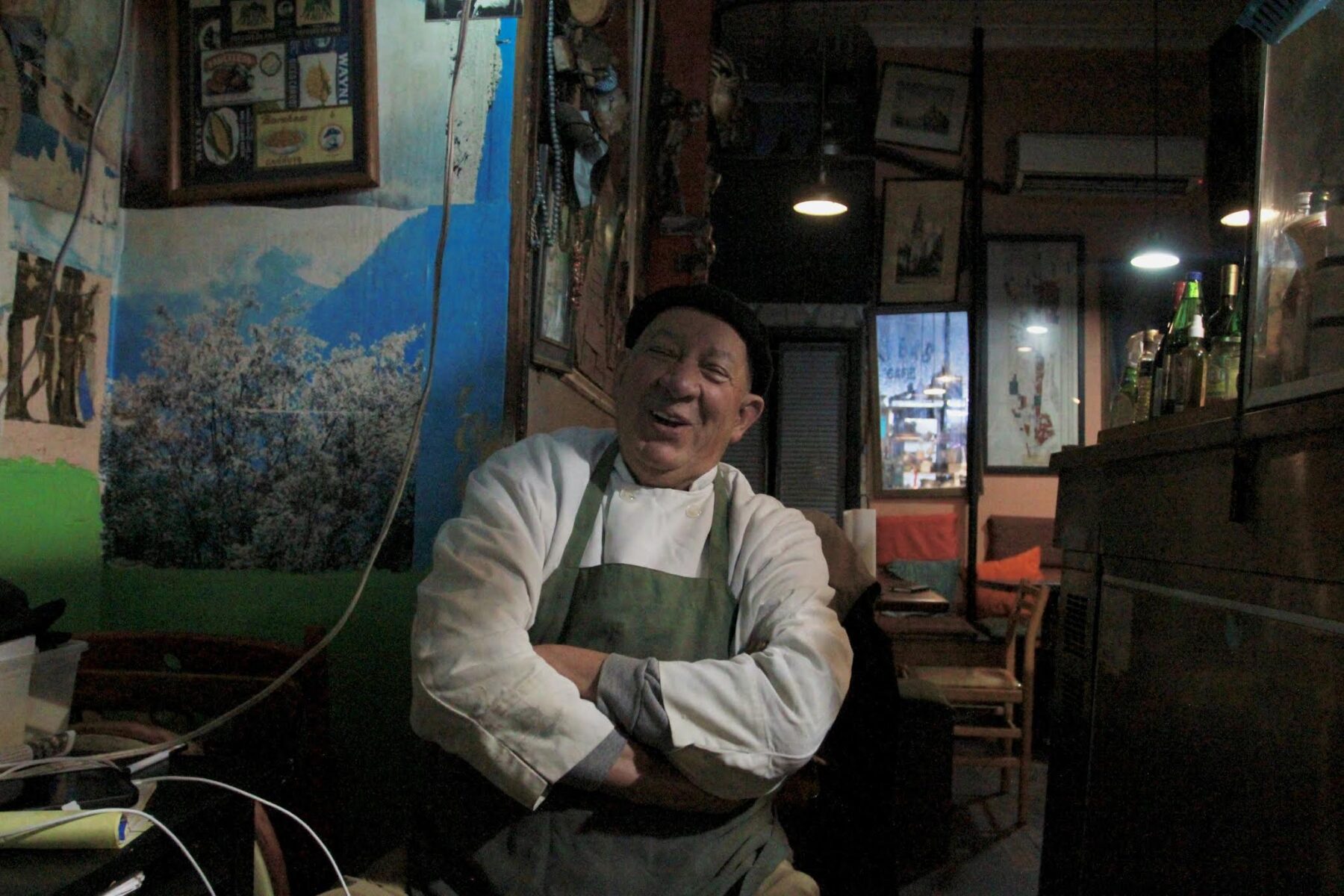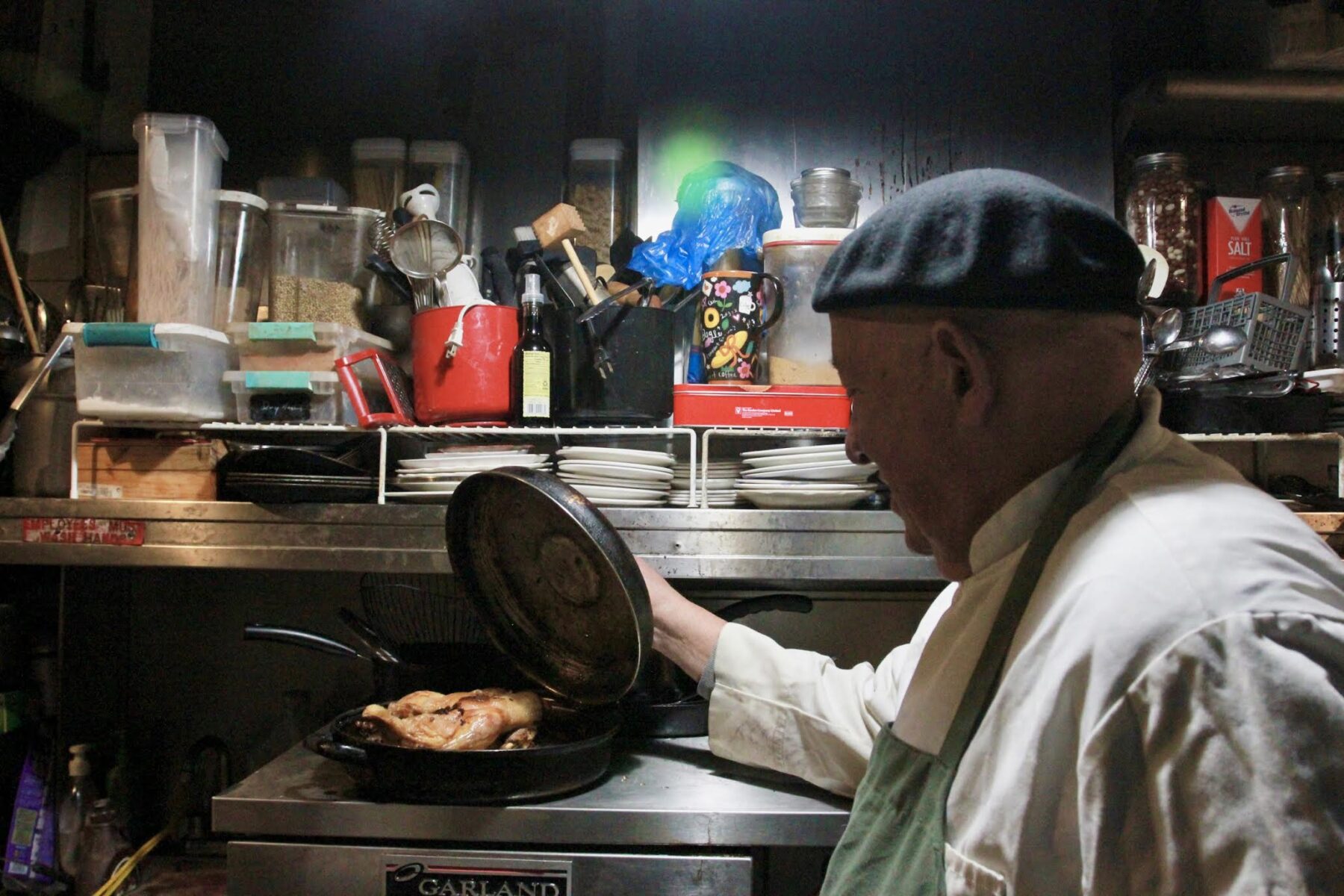
Ali El-Sayed, the chef/owner of Kabab Cafe in the Astoria neighborhood of Queens, New York. (Credit: Hoda Sherif)
Ali El-Sayed, the 72-year-old Egyptian owner and chef of Kabab Cafe in Astoria, Queens, deftly tosses piles of camel meat from a freezer onto his chopping block.
“Anything that walks, curls, flies or flinches, I eat,” he said. “And that is exactly what I serve to others.”
The 800-square-foot restaurant is wedged between a tiny barber shop and vacant storefront on a stretch of Steinway Street that runs from Astoria Boulevard to 28th Avenue. The strip is known as Little Egypt. The cafe is decorated with historical artifacts, ancient maps, pharaonic statuettes, including those of Nefertiti and Hatshepsut. Illustrations depict the grandeur of early Egyptian dynasties infused with blurbs of preserved Arabic manuscripts — some written by ancient historians. This quaint little world is Sayed’s and he wants everyone to know it.
“This is my house, baby!” he said between sips from a demitasse cup of steaming black tea with mint leaves.
Sayed’s vision for the restaurant was inspired by his upbringing in Alexandria, Egypt, where dining is embraced for its improvisation, naturally chaotic, and aromatic celebration of soulful “mama’s food.”
Never drawn to office work, he pursued agricultural studies as a young man in Alexandria, famed for its ancient trade in spices such as cinnamon, cassia, cloves and nutmeg. Intrigued by what Sayed described as “rich historical narratives” ingrained in native cuisines worldwide, food to him is never just that. Instead, meals are like conduits of cultural heritage that provide “third dimensional” insights into the ramifications of colonization and indigenous roots.
“Jazz is as American as apple pie,” Sayed said. “And the ancient library and our lighthouse is to Alexandria as salted, grilled fish is to our culinary soul.”
According to Sayed, the focus of Kabab Cafe isn’t just on serving Egyptian comfort food as it is to preserve the “intellectual prowess of ancient Egyptian civilization” for the Little Egypt community, and more broadly, New York City.
When he started the restaurant in 1989, it was one of the first Egyptian-themed businesses to open on Steinway Street. The area now has one of New York’s strongest Middle Eastern communities, according to Nicholas Alexiou, a lecturer at Queens College, City University of New York and founder of the Hellenic American Project.
Alexiou, a long-time regular at Kabab Café, recalls its early days. He said it was the first venue that he remembers where New Yorkers could get their hookah fix, a cultural phenomenon that has become “synonymous with Little Egypt’s close-knit community and nightlife.” Sayed calls himself the godfather of hookah cafes in New York City.
Sayed moved to Astoria in his early 30s after traveling through Eastern Europe to get a “real taste and understanding of the world.” He embraces his own distinct approach to hospitality. The menu taped outside the restaurant’s door is long out of date and has gone untouched for almost a quarter of a century. Instead, the dining options are the plat du jours determined by whatever culinary inspirations occur to Sayed on a given day.
The chef remains steadfast in his principles of authenticity by sourcing fresh produce from nearby local markets to supply for both his family and his restaurant’s kitchen.
“Stop by to eat, I’ll see what fresh ingredients I have,” Sayed said. “If someone doesn’t like it, then leave. Fine by me.”
Requesting takeout or delivery is the easiest way to offend the chef, because the essence of the meal can only be fully savored within the confines of Kabab Cafe’s dimly lit, four snug walls. “Don’t waste my time,” he said. “Customers should never disrespect Egyptian cuisine like that.”
Each meal is an opportunity for Sayed’s skilled Alexandrian craftsmanship and impromptu decision-making to unfurl in the restaurant’s cramped open kitchen, for all to see. He said he is dedicated to providing customers an unmatched dining experience in which they can “sit and relish in the seasoned, rich tapestry of Alexandrian flavors and exotic meats,” that evoke a heartfelt home-coming and a grandmother’s time-honored recipes.
That formula has so far won the restaurant admiring reviews for its inexpensive meals and eccentric style. Fodor’s, the travel guide publisher, calls the Kabab Cafe “charming.” New York Magazine says the “much acclaimed” destination “lives up to its billing.” In 2007, a New York Times reviewer fretted that a recent renovation might have altered the restaurant’s “weird magic.” It did not, he concluded.

Sayed with his freshly roasted duck. (Credit: Hoda Sherif)
The restaurant’s popular dishes include its creamy baba ghanoush, a smoky eggplant pulp blended with tahini, garlic, lemon juice and olive oil, as well as a mouthwatering meze platter of greaseless falafel balls dressed in deep-fried chicory leaves, fava beans, apple, cucumbers and hummus.
Shop owners along the strip, as part of their daily rituals, take comfort in their shared practice of savoring sweet delicacies from the bakeries and shops. They engage in conversation during breaks, enshrouded in the fragrant swirls of fruit-flavored hookah, while sipping on spiced Moroccan tea in the shared street that connects the array of Arab-owned shops and restaurants. All of this creates an atmosphere reminiscent of Egyptian street nightlife, said Jason Antos, a former resident and executive director of the Queens Historical Society.
Each Sunday, Sayed is adamant about closing his shop right at 8 p.m. Despite the usual closing time extending by two hours, he looks forward to catching his favorite bluegrass band’s performances at the Irish Whiskey bar over on 31st Street on Sundays. “Music is vital. Life, to me, is a dance, and I am the choreographer,” Sayed said, before humming the ethereal notes of “Ya Oum Allah” by the iconic Lebanese singer, Fairouz.
Almost half of all businesses in Queens are owned by minorities, contributing to a combined annual revenue of roughly $7 billion, Antos said. An American Community Survey estimated in 2021 that Astoria was home to almost 4,000 immigrants from Bangladesh, around 2,000 from Egypt, and over 1,000 from Morocco, with Arabs holding a significant presence near the mosques on the blocks off Steinway.
Before an Arab community coalesced around Steinway Street in the early 1990’s, the immediate neighborhood was known as Little Athens, according to Anna Castanos-Gravett, a Greek resident who grew up in the area. Suddenly, she said, an “overnight transformation” occurred, with Arabic and Dari language business signs quickly replacing signs in Greek.
Between 2000 to 2015, assemblies of Jordanians, Egyptians, Yemenites and Moroccans all flocked to what they saw as “a flourishing neighborhood” conveniently just 15 minutes from Manhattan, Castanos-Gravett said.
On a recent afternoon at 5 p.m., the quintessential midday respite for the shop owners of Little Egypt, Sayed settled into a cramped corner near the entrance. He sipped Turkish coffee between tastes from a honey-glazed baklava that he picked up at El Khayam Cafe across the street.
“We think we’ll never quite understand ancient dynasties and empires,” Sayed said. “But humanity is mistaken. If we close our eyes and savor the flavors of history, it will tell us a lot more than a degree ever could.”
About the author(s)
Hoda Sherif is an Egyptian/Iranian journalist receiving her masters at the Columbia Journalism School. Her reporting focuses on social justice, culture and race.



